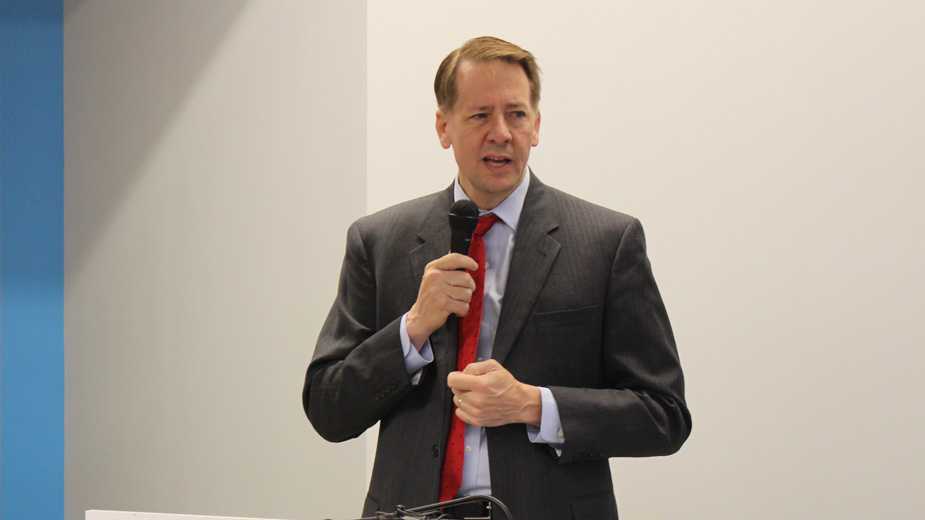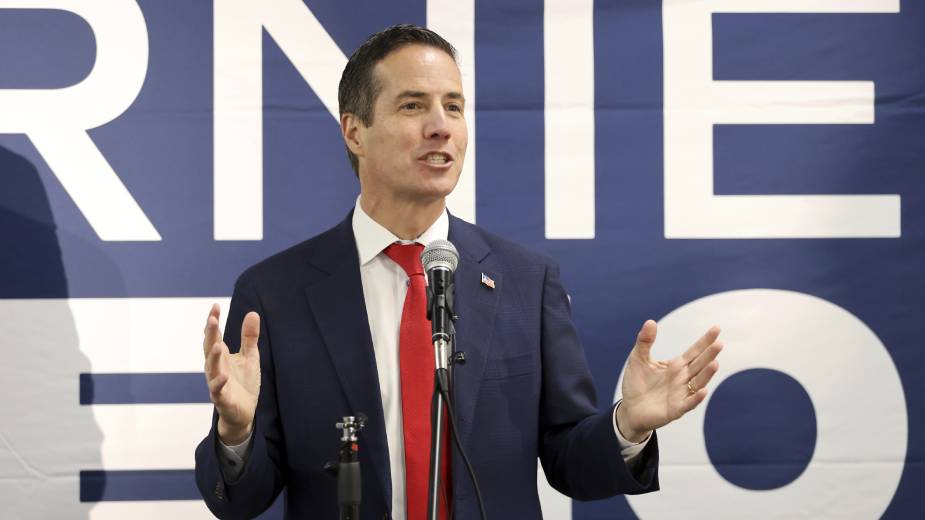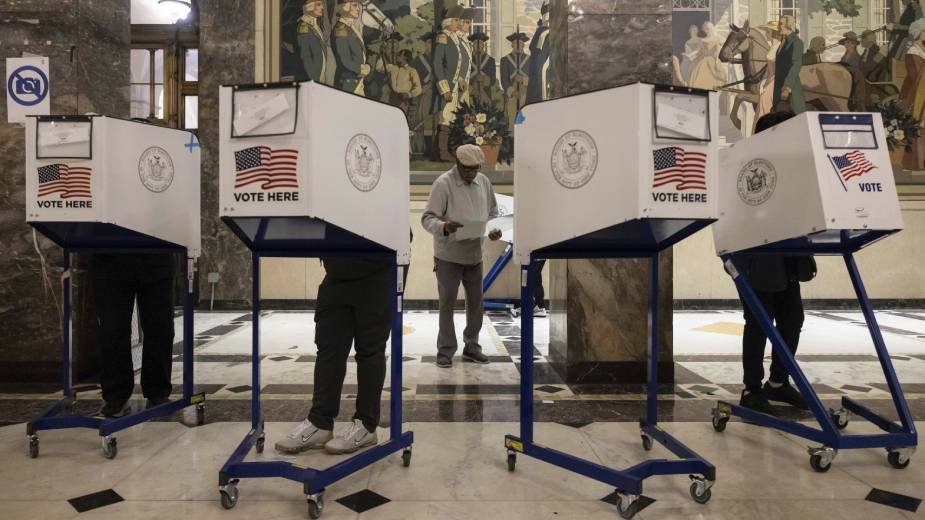Cordray Stumps Before Business, Labor Audiences
YOUNGSTOWN, Ohio – Democratic gubernatorial candidate Richard Cordray promoted plans to finance infrastructure improvements statewide as well as to improve workforce training and access to higher education during appearances Friday in the Mahoning Valley.
Cordray, a former state treasurer, state attorney general and the first director of the U.S. Consumer Financial Protection Bureau, addressed two distinct audiences.
He began his day in Youngstown as the featured speaker at the Youngstown/Warren Regional Chamber Lattes & Legislators event at the Youngstown Business Incubator Tech Block Building No. 5. From there, he traveled to Warren, where he addressed leaders of organized labor at the United Steelworkers Local 1375 hall.
Cordray faces state Atrorney General Mike DeWeWine, a Republican who has served as a U.S. senator and lieutenant governor. DeWine has said Cordray has “a track record of failure.”
State Sen. Joe Schiavoni, D-33 Boardman, who competed against Cordray for the nomination, rejected DeWine’s characterization of his former rival as he introduced him at YBI.
“He must have never watched Jeopardy’” Schiavoni quipped. Cordray is a former game show champion who participated in the quiz show’s Battle of the Decades tournament in 2014.
Among the initiatives Cordray promoted was a plan to finance infrastructure construction by putting a bond issue before voters. Funds would be used to rebuild roads and bridges, improve water and sewer systems, expand broadband access, and provide support for public transit.
President Trump, he noted, promised to rebuild the nation’s infrastructure.
“They’ve built exactly nothing. Everything went to the tax bill,” he said. “We will hold their feet to the fire.”
Cordray said he’s encouraged by local developments in additive manufacturing and advanced manufacturing – in fact, there is no more “non-advanced manufacturing” anymore, he remarked – but industries need skilled workers.
“That’s a challenge in the state of Ohio. We have a skills gap,” he said. “We have lots of people who want to work but they don’t necessarily have the skills to fill jobs that are available.”
Ohio needs “a flexible spectrum of training,” from vocational education in high schools to apprenticeship programs to helping high school students get college credits that would make college more affordable, he said. The state must bring down the cost of college and work with community colleges, which provide cost-effective ways for people to get the skills they need.
Cordray also called for enhancing the skills of current workers, and pledged to support the growth of small and medium-sized businesses.
Before both audiences, Cordray touted his efforts to keep people in their homes in the wake of the foreclosure crisis as well as those affected by the General Motors bankruptcy. “My folks worked overtime to make sure Ohio’s interests were protected in that bankruptcy,” he said of his tenure at the Consumer Financial Protection Bureau.
He pointed to legislation authored by his running mate when she served in Congress, Betty Sutton, that established the “cash for clunkers” program to boost sales of fuel-efficient vehicles.
“With all that effort, together we brought back the auto industry,” he said. “We need to advocate for the auto industry again.”
Cordray contrasted his efforts during the Forum Health bankruptcy, in which its assets were sold to Community Health Systems of Ohio, with DeWine’s inaction when Steward Health Care announced it would close Northside Regional Medical Center, one of the former Forum assets Steward purchased from CHS last year. The hospital closed this week.
Cordray put pressure on Community Health Systems to preserve jobs but DeWine “hasn’t lifted a finger” regarding Northside, he said.
DeWine has supported “every poorly negotiated trade deal” responsible for hollowing out the nation’s middle class, backed tax cuts for the wealthiest Americans that have expanded the deficit and loosening restrictions on Wall Street, Cordray said. The attorney general, on his first day in office, sought to take away protections for people with pre-existing conditions under the Affordable Care Act, he added.
“His policy for Ohio is the same thing,” he said.
Additionally, Cordray hit DeWine for the widening opioid crisis, which contributes to the difficulty of finding workers and tripled on the state attorney general’s watch.
The candidate more broadly criticized Republicans who control state government for their lax oversight of the Electronic Classroom of Tomorrow charter school, calling it an “epic failure on the part of our state government,” and pledged to hold failing charter schools accountable.
And he criticized GOP officials for taking money out of communities to grow the state’s rainy day fund, which he characterized as the “rainy day museum,” that people can look at but not touch.
Restructuring the tax system and looking at issues such as state control of school systems – the situation in Youngstown – and charter schools “absolutely” need to be looked at, said James Dignan, president and CEO of the Regional Chamber.
“By and large we are a donor tax community so we’re collecting more tax for the state than we get back in. It would be nice to see that turned around,” he remarked.
Toward the end of the YBI program, Cordray pledged to veto any right-to-work legislation that reaches his desk as governor, and to work to defeat it if brought before voters as a ballot issue.
The 2011 effort to roll back collective bargaining rights for public workers was highlighted early in Cordray’s visit to the USW local in Warren. Gary Steinbeck, USW Sub-District 1 director, reminded the 30 or so union members, elected officials and guests about the legislation, Senate Bill 5, which the Ohio General Assembly approved and Gov. John Kasich signed into law.
Ohio voters overturned S.B. 5 by referendum later in the year, an effort unlike any Steinbeck said he had ever seen.
“There’s no telling what [Kasich] would have done except he decided he wanted to run for president,” Steinbeck remarked. He also questioned what DeWine might do,.
DeWine has said right-to-work is not on his agenda. He also has criticized Cordray on the drug issue and his support for State Issue 1, which reduces criminal sentences for non-violent drug offenders.
“This is a major race for us to define who we are as a party,” state Sen. Sean O’Brien, D-32 Bazetta, said in Warren before introducing Cordray.
Being elected governor would give local Democratic lawmakers, who are in the minority in both houses of the Ohio Legislature, a partner in the governor’s office, Cordray said.
“Nobody knows how to campaign like labor does, and we need to get out there and we need to work,” Steinbeck urged.
“There’s a lot of energy right now from a good portion of people. Obviously, our situation should help get more people engaged,” said David Green, president of United Auto Workers Local 1112. “We’re just making sure right now that we are registering voters and that they know about early voting so they can get out there and vote.”
Jose Arroyo, USW staff representative, said there is more “buzz” surrounding a midterm election than he has seen in some time, which he attributed to the national political environment.
“There seems to be a ton of interest right now going on, particularly in the governor’s race, because Mike DeWine hasn’t exactly been labor-friendly on a lot of our issues,” Arroyo said.
Copyright 2024 The Business Journal, Youngstown, Ohio.



